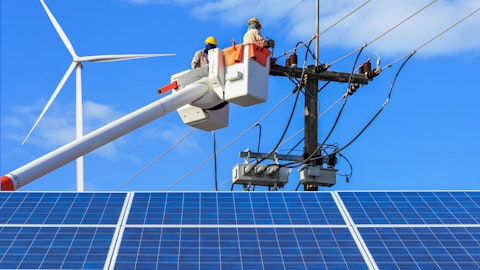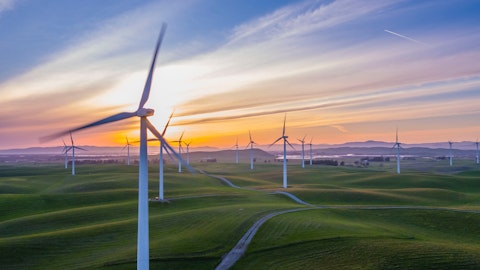Julien Dumoulin-Smith: And sorry, lastly, you said that you have work to do, yes go forward.
Bill Siwek: Yes, you always have work to do, right? It’s called continuous improvement. And again, when you’re dealing in an extremely manual process, there’s always improvements you can make. But we’ve had a very, very good long-term track record from a quality standpoint. The large issue that we specifically provided for this quarter. Think about how we talked about it, inspection and repair. So a lot of this is proactive. There were some nonconformances found out in the field before blades were put up tower. We looked at those with our customer, and we developed a plan make sure that we inspected every blade. And if there was the need to repair, we would repair and if not, we would move on. So it’s not like we have blades failing in the field, blades flying off towers, this was more proactive to make sure that we never get into that situation.
And again, for many of these blades, they will be relatively minor repairs that are done. Some blades will likely not have any and others will have some repairs to do before they go up tower.
Julien Dumoulin-Smith: Right. And you still reconfirmed your high single-digit EBITDA margin target, although you didn’t specify a time line necessarily. But seems like the warranty cost, the higher OpEx, et cetera, still hasn’t taken you off that goal?
Bill Siwek: Well, that higher single digit, we said in a couple of years, right? We’ve got to get through – we’ve talked about 2023 being a transition year, 2024 a bit of a transition year as some of the transitions that we planned from a line standpoint as well as start-ups have moved to the right a bit by our customers. And so we see 2023 and 2024 really as not only industry transition years, but TPI some TPI transitions as it relates to lines. And so we see ourselves exiting 2024, entering 2025 more on that run rate.
Julien Dumoulin-Smith: Thanks for the time. I appreciate the details.
Bill Siwek: Yes, thanks Julien.
Operator: Your next question comes from Mark Strouse from JPMorgan. Please go ahead.
Mark Strouse: Yes good afternoon. Thanks for taking my questions.
Bill Siwek: Hi, Mark.
Mark Strouse: I’m thinking back to the second half of last year, maybe around the same time that you announced the GE contract in Iowa. You were talking about you’ve been in discussions with other OEMs as far as potential U.S. manufacturing. Has this quality issue impacted those conversations at all?
Bill Siwek: No. We’re still – we’re evaluating sites today and still in discussions with multiple customers for sites within the U.S.
Mark Strouse: Okay, good to hear. And then with the announcement today with GE, how should we think about when – assuming that you get the full contract in 3Q. What the timing of that might look like as far as when that might start? And since it’s in areas, is there any disruption to your existing lines while that process is ongoing?
Bill Siwek: Yes. So if you remember, Mark, we had we had an empty facility in Borås. So this is the empty facility. So GE will be moving into that new facility, and we expect production to start early next year.
Mark Strouse: Got it, okay. Thank you very much.
Bill Siwek: Yes.
Operator: Your next question comes from Justin Clare from ROTH MKM. Please go ahead.
Justin Clare: Yes, hi guys. So I wanted to start with the demand picture a bit here. You indicated demand might be pushing to the right a bit and into 2025 just given that backdrop, maybe you can walk through what your expectations are for your open lines. It sounds like you’re going to be exiting 2024 with 39 lines. So it seems like you’re adding the four with GE, there’s two others that you’ll contract. And then maybe the five lines in – or the potential five lines in Iowa, Those might not get contracted in the near term. So just maybe if you can walk through what you’re expecting here?



